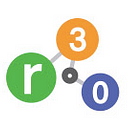By Bill Baue & Ralph Thurm
Embarking on the second decade for r3.0 (Redesign for Resilience & Regeneration) offers an opportunity to orient ourselves by scanning the horizon for our way forward while also turning around to view our journey through the past.
Of course, we as living beings only ever exist in a perpetual present, so starting there, we at r3.0 find ourselves at a confluence, merging our long-standing work focused on organizational accountability with our newer place-based focus — specifically looking through bioregional and municipality lenses.
This ongoing work on organizational accountability itself represents a kind of confluence of successes and challenges. Atop the list of successes is our 4-year collaboration with the United Nations Research Institute for Social Development (UNRISD) to jointly conceptualize, pilot, and ultimately launch the UN Sustainable Development Performance Indicators (UNSDPIs) in 2022. Since then, we have been actively advancing practice through our monthly UNSDPI Trainings.
As for the challenges, we chronicled those in our The Lost Decade Common Good Resource report, documenting how the sustainability standards have essentially sabotaged sustainability. Seeing as these standards act as normative institutions, we can only say that our institutions are failing to steer us in the right direction, at the very moment we need them to do so the most.
The success struggles mightily to make up for the systemic dysfunctions perpetrated and perpetuated by the challenges.
So, it should come as no surprise that we continue to widen our aperture to take in other strategic angles. Specifically, we first encountered the notion of the bioregion as the “unit of management” for assessing necessary transformation, in John Fullerton’s Keynote at our 2015 Conference. This message was reinforced by Joe Brewer in his Keynote at our 2019 Conference, and by the end of that year, r3.0 had joined the Regenerative Communities Network via the Connecticut River Valley Bioregional Collaborative. But this place-based work remained on the sidelines of r3.0’s focus.
Now, as we move forward, we shift this place-based focus from the edge to the center. In addition to our bioregional work — for example, through the development of Funding Ecosystems for Bioregional Learning Centers through the Co-Creating Funding Ecosystems for Regeneration community that is activating the recommendations from our Funding Governance for Systemic Transformation Blueprint — we are also deepening our collaboration with our Advocation Partner, the Flourishing Enterprise Institute (FEI), on its municipality work — for example its Municipalities Adapting in Response to Complexity (MARC) partnership with ICLEI (see here for more on this). Of course, municipalities are nested within bioregions, so there are clearly fractal relationships here.
We merge our work in this place-based direction not only due to the relative promise of effectiveness (compared to the dysfunctional sustainability standard setters), but also because it aligns with the imperative — from our post-collapse readiness perspective — to continually enhance the resilience of the places we live, so that those places can continue to provision our needs across the spectrum from the physical to the spiritual.
So, what does all this mean in practice? One thing is doesn’t mean: we are not necessarily abandoning our work at the organizational level — we will continue to advocate for organizational accountability for the sustainability of their impacts, so organizations can contribute to regeneration and flourishing, within and beyond their own boundaries. As specific opportunities at the organizational scale present themselves, we will assess them on their own merits.
And, we’re diversifying into the place-based space, in some instances using the same kinds of tools we’ve deployed in the organizational space. For example, the City of Kitchener participated in the pilot testing program we ran for UNRISD, and the City of Nanaimo has taken this a step further, by building out more sophisticated indicators using the MultiCapital Scorecard.
As you can see, we’re not abandoning our history to pursue this new direction, but rather simply expanding our horizons!
